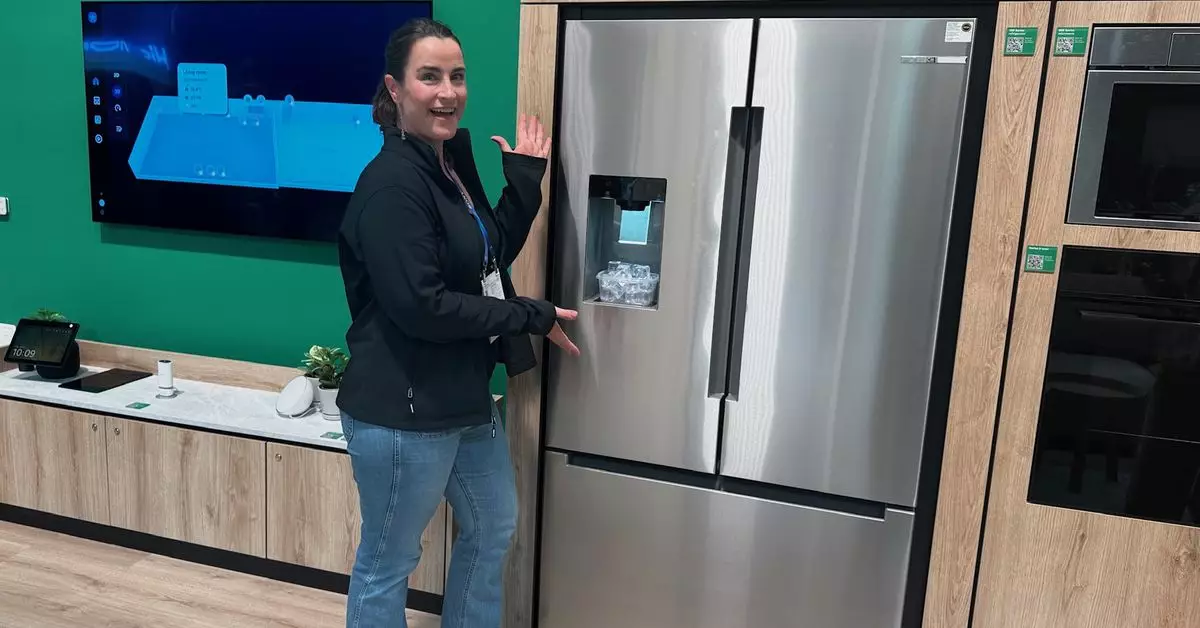The realm of smart home technology is rapidly evolving, with manufacturers striving to create appliances that are not only functional but also seamlessly integrated into our digital ecosystems. Bosch, a renowned name in home appliance manufacturing, has taken a significant step forward by debuting its first Matter-enabled refrigerator. This innovation, showcased at CES, marks an important milestone in the journey toward smarter kitchens and homes.
Unveiled recently, the Bosch 100 Series Frech Door Bottom Mount Refrigerator is set to hit United States markets in the spring, priced at $2,500. At the heart of this new appliance is a dedicated chip that allows it to support Matter—a modern interoperability standard designed to facilitate communication between smart devices across different platforms. This pioneering fridge represents not just a product innovation but an alignment of Bosch’s commitment to enhancing the smart home experience, also performed through previous product launches like the Siemens XXL Fridge at IFA Berlin.
With the 100 Series refrigerator, users can expect a myriad of features, including remote temperature control and notifications relayed through their chosen smart home platforms. Eelco Lammertink of BSH, the parent company of Bosch, Siemens, Thermador, and Gaggenau, explained that the refrigerator is poised to redefine user interactions with their appliances by enhancing functionality while maintaining ease of use.
Matter is a revolutionary advancement in the world of home automation. Unlike traditional systems that rely heavily on cloud connections, Matter facilitates local communication between devices, ensuring faster and more secure interactions. By establishing a common language for dynamic communication, Matter promises smoother integration of IoT devices across a myriad of ecosystems.
Currently, support for Matter is limited to platforms like Samsung SmartThings and Home Assistant, though there are plans for Amazon to jump on board in the near future. As expected, Google Home and Apple Home were not detailed in the latest announcements. Understanding these dynamics is crucial as consumers look for interoperability in their smart homes. They want devices that not only work well individually but can also cooperate seamlessly as part of a broader, interconnected environment.
Bosch’s strategy extends beyond just refrigerators; the company plans to adapt the Matter standard across its entire line of appliances, thereby paving the way for a future where smart kitchen devices can work in tandem. In fact, Lammertink indicated that 2026 could see three additional appliance categories equipped with Matter compatibility, signifying a long-term commitment to smart home technology.
Moreover, the 100 Series is set to offer energy reporting features, which will allow users to manage their appliance energy consumption effectively. Such integration could prove vital as households increasingly seek to lower energy costs while contributing to sustainability goals. Although Lammertink mentioned that existing appliances would not be updated to include Matter, the focus remains on innovating new products that meet the challenges presented by modern consumers.
The development of Matter is a collaborative effort from giants like Apple, Amazon, Google, and Samsung. This open-sourced initiative includes an inclusive IP-based connectivity software layer that supports a variety of home devices, from lighting to thermostats and even robotic vacuum cleaners. When you see the Matter logo on a device, it signifies an assurance of compatibility with other Matter-enabled systems—an increasingly appealing feature for tech-savvy consumers.
In a future where homes will be filled with interconnected devices, the implications of this standard cannot be overstated. By uniting various devices under a single protocol, users can enjoy a multitude of benefits, including ease of setup and streamlined management across multiple platforms.
Bosch’s introduction of the Matter-enabled 100 Series refrigerator is a noteworthy development in the ongoing evolution of smart home technology. As the integration of appliances into digital ecosystems progresses, the potential for enhanced functionality and user experience grows exponentially. With Matter setting the stage for smoother interoperability, consumers can look forward to a future where their homes not only provide nourishment but also smarter, more efficient living. As users navigate through their digital appliances, Bosch’s commitment to this new standard signifies a promising leap forward on the path toward an interconnected home.


Leave a Reply